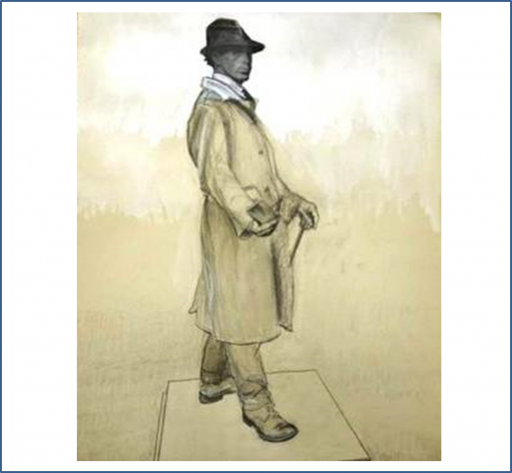Centenary News contributor Dr. Jillian Davidson explains why she believes the First World War poet Isaac Rosenberg should be recognised.
The poems of Isaac Rosenberg, written from the trenches, were among the finest English poems of the First World War, if not the finest. According to Paul Fussell, Rosenberg’s “Break of Day in the Trenches” was “the greatest poem of the war.” Herein, the poet addressed “a queer, sardonic rat,” whose cosmopolitan sympathies allowed the rodent a freedom of movement greater than man’s.
Born in 1890, Isaac Rosenberg was the son of Jewish Lithuanian immigrants and grew up in the East End of London. His family was so poor that he had to leave school at 14, but he continued his studies at night at Birkbeck College and then won a place at the Slade School of Fine Art, which he attended from 1911-14.
Rosenberg enlisted in the First World War in 1915 purposely to receive a soldier’s pay to help support his mother. Barely 5 feet tall, he fell short of the minimum height for a soldier in the British Army, which was 5 ft 3in. So he joined the Bantams, especially formed units for men of lesser physical stature.
Isaac Rosenberg was 27 when he was killed on the Western Front, at dawn on April 1, 1918. At first, he was buried in a mass grave, but in 1926, his remains were identified and reinterred. On his gravestone in Pas de Calais, France, are recorded his name and profession: “Artist and Poet.”
His self-portraits hang in the National Portrait Gallery and the Tate Gallery, London. On November 11, 1985, Rosenberg was among 16 Great War poets, who were commemorated on a slate stone unveiled in Westminster Abbey’s Poet’s Corner. In 1987, a commemorative blue plaque to Rosenberg was unveiled outside The Whitechapel Gallery. In 1998, on the 90th anniversary of the Armistice treaty, famously signed in a train carriage, the Poems on the Underground project made readily available to three and a half million London commuters per day Isaac Rosenberg’s anti-war poem “On receiving news of the war.”
London Statue
Plans are underway to erect a statue in Rosenberg’s honour in Torrington Square on the Birkbeck College campus in Bloomsbury. The proximity to the two learning centres, Birkbeck and the Slade, makes this a fitting site to commemorate his life and works. Etienne Millner, a Fellow of the Royal British Society of Sculptors and President of the Society of Portrait Sculptors, is the sculptor chosen for the project.
The statue will not depict Rosenberg in uniform, but, based on Rosenberg’s self-portraits, he will wear his greatcoat and favourite Austrian hat, with a book in hand. The actor Sir Anthony Sher is a patron of the campaign, which needs to raise £75,000 to fund the statue. It is hoped that the statue will be unveiled on April 1st, 2018 on the one hundredth anniversary of the poet’s death.
For further information, please contact Clive Bettington, founder and chairman of The Jewish East End Celebration Society, an organization dedicated to preserve the Jewish history and heritage of London’s East End.
Contact details:
c.bettington@jeecs.org.uk
07941 367882
